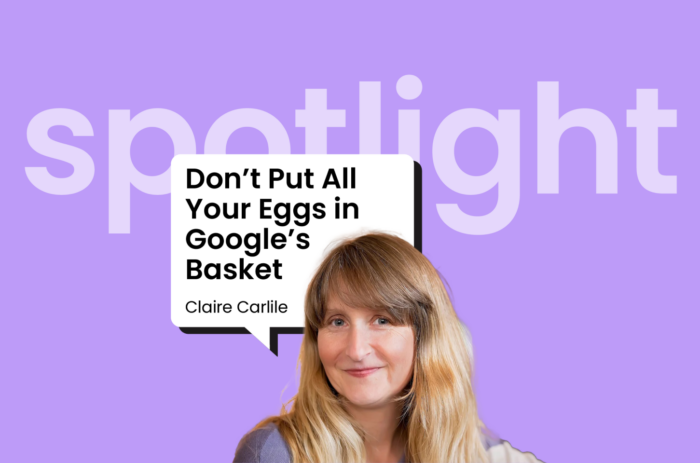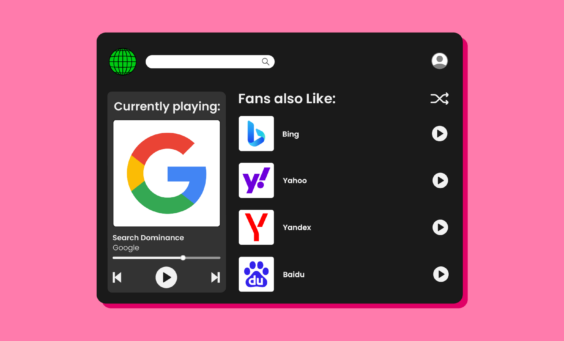In the last few years, I’ve taken Google’s monopoly in search for granted, and indeed I have cemented that dominance by turning to Google to help me out in a personal capacity many many many times a day…
- Want to know how to fix a broken zip? Google it.
- Want to go on a riverside walk in a new part of town? Google it.
- Want to do a sponsored run for a charity of your choice? Google it.
- Want to buy bubble tea near you? Google it.
Chatting with my daughter I’ll find that I’ll quite naturally use Google as a verb in terms of solving any conundrum—from ‘do sloths explode if they don’t fart?’ through to ‘is there a Studio Ghibli world in Japan?’ to name just a couple from the last week.
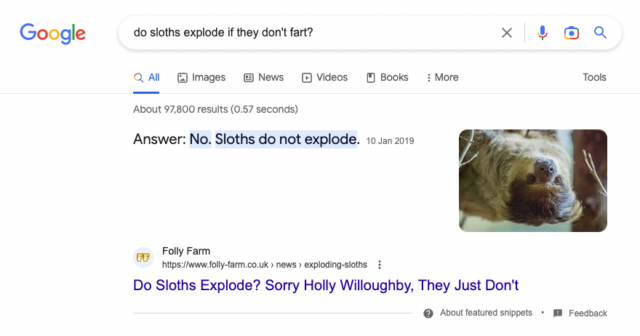
In a professional capacity, to say I’m ‘cemented’ in the Google infrastructure would be an understatement. Let’s gloss over the reliance on various Google hardware and software and focus on my primary professional offerings—the things that pay the bills, and keep my mental cogs whirring.
On each and every work day, I without fail, think about Google Search, I read about Google Search, I write about Google Search and I work with businesses to ‘make the most of the opportunities provided by Google Search’.
I encourage businesses to think about their customers and potential customers and how they search on Google. I work with them to improve their rankings on Google, and to improve their visibility in the search engine results page (SERP) in terms of rich elements. I encourage them to have website content that will meet the needs and intent of the visitors that they get from Google, and website content that can be crawled and indexed by Google.
And I don’t need to describe to you the focus that I give to Google Business Profiles (GBPs) and their importance at all stages of the customer journey. This is my bread and butter, this is what I DO!
And for good reason. Every day Google processes over 8.5 billion searches (source) and Google is the most frequently used search engine worldwide, with a market share of around 84.69% (source).
But wait a minute. Did someone mention eggs and baskets, and how one should not place all of their zygotes in the same receptacle?
Is the Sky Really Falling Down?
As SEOs, we’re pretty used to the at least annual ‘SEO is dead’ conversations. Voice search killed it, and now AI. But we’re still here, aren’t we?
But what if Google pulls the rug out from under the businesses that rely on GBP as a low-cost option for reaching their customers—either by monetizing the product or doing something else that means GBP is no longer a viable option for the masses of small businesses that it currently ‘serves’.
But what if Google does lose the monopoly on search? What if our potential customers start to (or continue to) commence and continue their purchase journey somewhere other than Google when they’re looking to meet their ‘know, go, do, and buy’ needs?
Various Google antitrust concerns and their related investigations rumble on—the most concerning of which (to us as local SEO and local business owners) is that related to Google’s ‘sprawling mapping service’.
In my monitoring of the local knowledge panel in the SERP, on some devices and browsers, I started seeing a pared-back panel for the business—a click to call, a click for directions, and a click to the website only, rather than the plethora of GBP features and functionality we have come to expect (and indeed rely on):
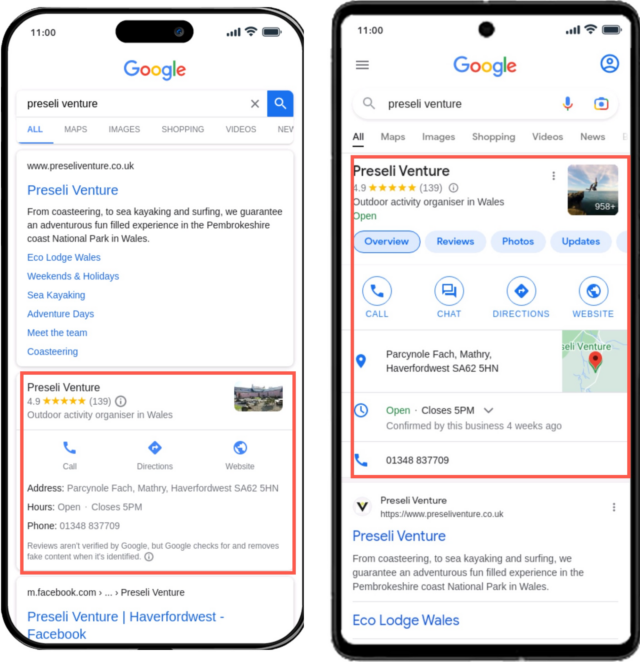
The ‘European Digital Market Act’ could also spell huge changes in the SERP.
This piece suggests that the visibility of Google Business Profile listings could be impacted from 90% to 95% (in terms of not actually being visible in the SERP), as in the example below:
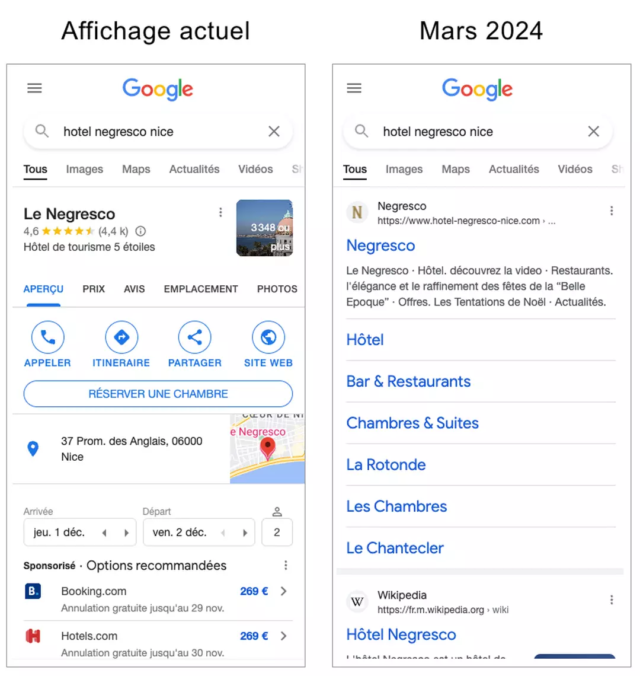
Source: Journal Du Net © Nicolas Chevallier. Image translation: Current Display > March 2024
Moving forward the likelihood of a less rich SERP experience in Google, or indeed a move away from Google altogether, should be considered and planned for.
So, let’s get to it!
People Before Platforms
Reliance on the behemoths of online platforms (Facebook, Google, YouTube, and the like) can often be a ‘default’ setting for many small and medium-sized businesses and their marketers who, in my experience, often mistake tactics and channels for strategy.
We need to revisit some of the primary marketing tenets before we dive into thinking about life beyond Big G.
In order to consider which platforms and channels could replace Google we need to get back to the ‘people’.
Who Are the People?
In the first instance, they’re our customers and potential customers. They’re the people for whom we solve problems; they’re the people that have, and could have, their wants and needs met by our products and services.
We need to know what these people are looking to solve. What is the itch that they need to scratch? What are the factors that will influence their choices? Which of the features and benefits of your product or service will be most attractive to which types of customers and potential customers?
Another set of people are our competitors. They’re the people we are up against when we compete for the hearts, minds, and wallets of our customers and potential customers. What do they do better than us? What do we do better than them? What are the features and benefits of their products and services?
Where Are My People?
When you’ve attended to the above you’re going to be in a much better position to explore channels and platforms that might be new to you as a business, or that you’ve explored a little but know that you’ve not totally made the most of the opportunities.
A Few Tried and Tested Ways to Connect With Your Customers
Take it Offline
Not everything needs to take place online. Go old skool and start to think about how people go about solving their problems and finding a product or service provider that can make their heart sing, or at least fix their car’s suspension. I’m thinking of word-of-mouth referrals, I’m thinking of loyalty schemes, I’m thinking of ‘refer a friend’, I’m thinking of local pamphlets, posters, and community newsletters. I’m thinking about leveraging offline relationships to explore partnerships, and dare I say it, ‘synergies’. It just feels so damn wholesome!
Other Search Engines are Available
I’m not sure if you’ve heard of Bing? I joke.
Seriously, make sure you have at least the basic and correct presence in these places, and keep an eye on any new opportunities as new features and functionality are added—maybe we’ll even see an Apple Search Engine at some point in the future?
Your Website
If you’ve been treating Google as ‘your new home page’ (hat tip to Mike Blumenthal, for that phrase, though of course he never suggested that you don’t need a website!) and letting your actual business website gather dust like a succulent on a window ledge, it’s time to dust that thing off, give it a drop of water and expose it to some sunlight.
Your website is your business entity’s ‘home’—and you need to treat it as such, keeping it up to date in terms of the products and services you offer, your important business details, and anything else that is essential to help your potential customers choose you, and your existing customers continue to choose you.
Segway to my BrightLocal Academy courses on location pages, and other content for local business websites.
You’re welcome.
Referring Sites
When I talk about ‘referring sites’, I’m talking about websites that refer traffic to your website.
I’m not explicitly talking about ‘links’ here or the value of links from an algorithmic perspective. I’m talking specifically about websites that link to your website that refer visitors (AKA the actual people that are looking for a solution to a problem that you can solve via your products and services) to your website where they’ll be able to find the information that they need to make a decision about whether or not they want to do business with you, and then take the next steps in actually actioning that decision.
Make sure you know which sites already refer visitors to your website, and how those visitors convert, and always be thinking about building and developing relationships with other websites that could also refer potential customers.
Get on the Socials
TikTok is the new Google anyway, supposedly. Except it’s not. Jokes aside—social channels can be a useful way to connect with people that are looking to solve various problems. Just make sure that you adhere to good social etiquette—don’t spam platforms with self-congratulatory or over-promotional content. Listen first. Be helpful. Be real. Be a friend.
After the flurry of creating a ‘newsletter sign up’ option on your website and sending a few half-arsed, overly promotional emails, many smaller businesses that don’t have the luxury of a dedicated marketing team decide that email marketing just doesn’t work for them.
Think again. Email is your chance to develop relationships with your existing and potential customers through on-brand personalized messages that will meet the needs of these engaged users—users who are likely to be at all stages of the buying journey, but who have actively ‘opted in’ to receive your messages. Through email, you get to have conversations and be authentic with people who have signed up and have given you access to their inboxes.
And There’s More
Amazon, Reddit, Meta, Nextdoor, Video, YouTube, Influencer Marketing, Sponsorship, Display, Events, Content Marketing, Online Ads, Offline Ads, Public Relations, and Partnership Marketing—there are a plethora of channels and platforms that any business (small or otherwise) can employ to help them reach their target market.
Google hasn’t gone anywhere… yet. If organic search is delivering for your business—great stuff. Make the most of the organic opportunities offered by Google, but I suggest you have a little think about diversifying your marketing efforts so that if things do go tits up you’ve distributed your marketing eggs between a range of promising baskets.
Final Thoughts
Before you dive in, make sure that you have the answers to these questions:
- Will my customers and potential customers use this channel or platform to seek out solutions to their problems and is there a place for me to promote my products and services accordingly?
- And in a way that is going to be likely to help people choose my products and services over a competitor?
- And a way that is likely to lead to a long-term relationship with this person?
- Are my competitors already using this channel, tactic, or platform successfully, and if so what can I learn from them?
- Is there a way for me to measure the efficacy of this tactic, channel, or platform—even at the most rudimentary of levels?
When it comes to marketing superpowers, small and medium-sized businesses can win big beyond Google and beyond those behemoth platforms we mentioned.
The power of ‘actually giving a shit’, the power of knowing (and I mean REALLY knowing because you meet them day to day) your customers, the power of caring, the power of being committed to building authentic relationships in your niche and geographic area, the power of being committed to listening to feedback, to continuously improve your product and service offerings and to staying agile in a changeable marketplace where ‘doing a Google’ might not always be the first step on a potential customers purchase journey, are the superpowers that I encourage you to explore and develop.
Go forth and diversify!
